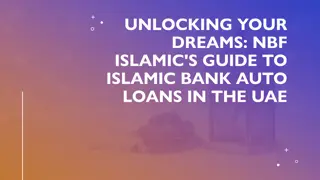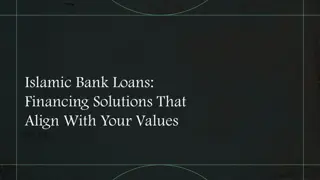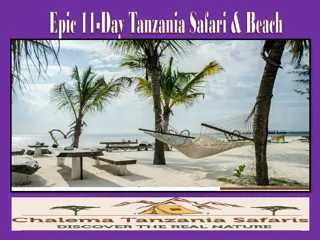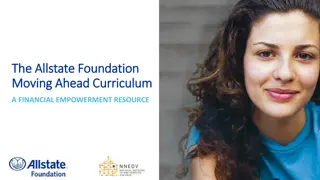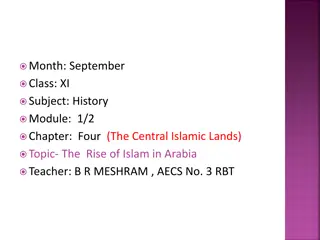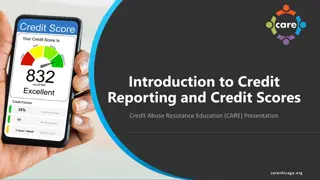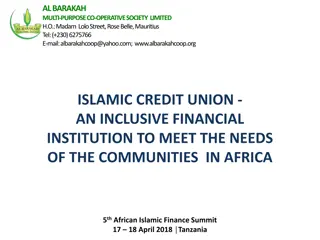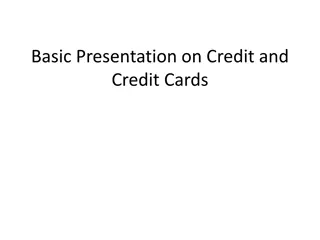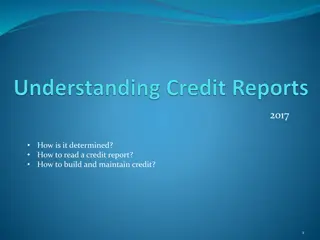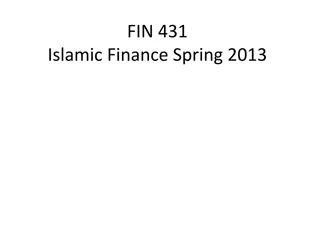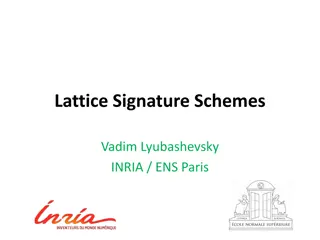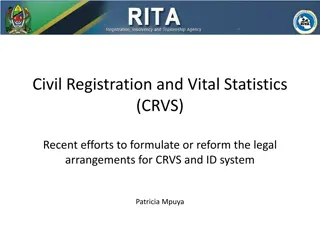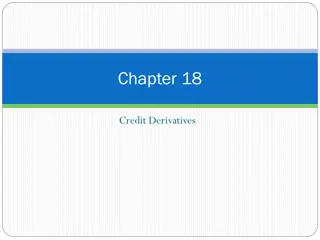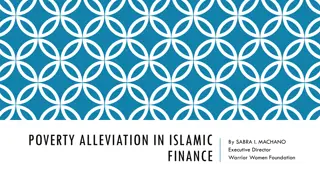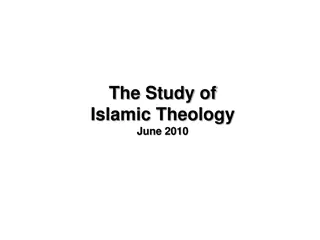Understanding Islamic Credit Guarantee Schemes in Tanzania
The article discusses the importance of Credit Guarantee Schemes (CGS) for small enterprises in Tanzania, highlighting challenges faced in accessing traditional financing. It explores the role, benefits, types of CGS, existing guarantee schemes in Tanzania, and concerns regarding Islamic finance compatibility. Recommendations for enhancing CGS effectiveness are also provided.
Download Presentation

Please find below an Image/Link to download the presentation.
The content on the website is provided AS IS for your information and personal use only. It may not be sold, licensed, or shared on other websites without obtaining consent from the author. Download presentation by click this link. If you encounter any issues during the download, it is possible that the publisher has removed the file from their server.
E N D
Presentation Transcript
ISLAMIC CREDIT GUARANTEE SCHEMES (CGS-i) By Khalfan Abdallah.
CONTENT o Introduction. o Role and Benefits of CGS. o Types of CGS. o Guarantee Schemes in Tanzania. o Impediments to achieve CGS Objectives in Tanzania. o Islamic Finance (Shari ah) Concerns on CGS. o Alternative Shari ah compliant CGS. o Recommendations and Conclusions.
INTRODUCTION There are more than 3 million micro and small enterprises in Tanzania, employing over 5 million people. Only 10.6 % had access to financial services provides such as banks. Survey of136 small firms in Tanzania, 63% of them consider that difficulty in accessing financing as the major constraint to their development (Satta, 2003). SMEs comprises only 14% of total lending by Tanzanian banks compared to 17.4% in Kenya (Gunhild Berg and Michael Fuchs, 2013). Banks have focused more on corporate financing due to heavy reliance on collateral requirements (up to 125% or more of loan value). Credit guarantee schemes are one solution to this problem. There are 2250 CGS in almost 100 countries. 15 CGS in Tanzania, 3 of them have suspended [FSDT].
ROLE AND BENEFITS OF CGS. According to the World Bank, CGS provides third party credit risk mitigation to lenders (financiers) through the absorption of portion of lender s losses on the loans (credit facilities) made to SMEs in case of default, typically in return for a fee. Advantages: Opening banking opportunities, access of favorable credit conditions, increased credit size, reduced collateral required, increased credit maturity, financial sector deepening, and relationship. Disadvantages: increasing guaranteeing party administration costs, increasing the danger of moral hazard, increasing turn-around time, being subsidy-dependent and weakening of credit discipline financing or credit or no amount of improved banks-MSME costs of credit due to
TYPES OF CGS. Public or government CGS Private or Corporate CGS Donor Funded CGS. International CGS Mutual Guarantee Schemes Private-Public Partnership
GUARANTEE SCHEMES IN TANZANIA. ARIZ Funded by Agence Francaise De Developpement (AFD) 1. PASS (Private Agriculture Sector Support). SME and Microfinance credit guarantee scheme Women Access to Finance at CRDB Funded by DANIDA 2. 3. CRDB Bank guarantee Funded by AfDB and USAID Agricultural Credit Guarantee (ACG) Funded by AGRA, OFID and Kilimo Trust Export Credit Guarantee Scheme (ECGS) Funded by the Government of Tanzania African Guarantee Fund Funded by AfDB and the Governments of Spain and Denmark Amana Bank Credit Guarantee Funded by USAID.
IMPEDIMENTS OF CGS IN TANZANIA. Cash versus Paper Guarantee. Low education level which makes it difficult to access banks. Infrastructure so that the banks can have wider outreach. Judicial system is very slow. Higher default rates. Lack of reliable information on the customers.
ISLAMIC FINANCE CONCERNS WITH CGS. Guarantee Framework Agreement. Terminology used: Loans and interest rates. Roles of partners. Eligibility. Fees Risk sharing fee. Origination fee. Utilization fee. Risk management instruments for CGS. reinsurance, loan sales or portfolio securitization.
ALTERNATIVE CGS Takaful insurance model. The Islamic Corporation for Insurance of Investment and Export Credit (ICIEC). Mutual Guarantee Association. Islamic Social Finance model. Islamic social finance contracts are employed to design the scheme. This ranges from using Sadaqa or Zakat or Waqf to a combination of these contracts. Crowd funding platform. Partnership model. This involved guarantor partnering with Islamic financial institution to share profit or loss from financing MSME client.
RECOMMENDATIONS AND CONCLUSIONS Harmonization to maximize impact. Monitoring. Awareness. Judicial system more efficient. TAT on commercial disputes. ADR. Embrace diverse business models. Takaful-cooperative insurance model. Credit Reference Bureau.
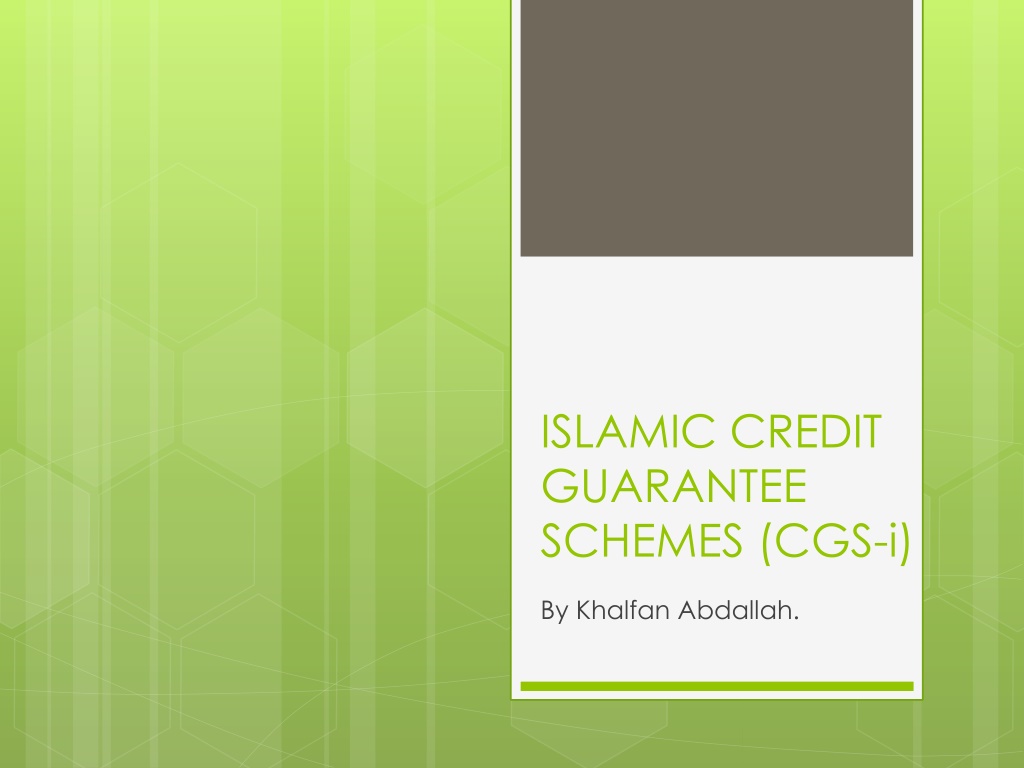
 undefined
undefined








